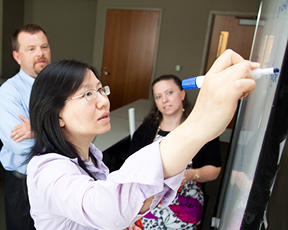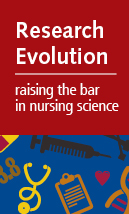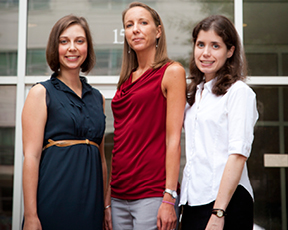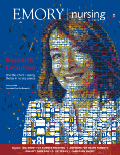Research Evolution

Betsy Corwin (right) studies the biological mechanisms behind postpartum depression and fatigue. She also leads the Office of Nursing Research to help faculty and students enhance and expand their scientific studies.
By Pam Auchmutey
How the school is raising the bar in nursing science
|
|
Betsy Corwin PhD RN remembers the home visits with two new mothers clearly. One of the women had just had her second child, was newly divorced, and had a hole in her kitchen ceiling. Her first child, a 6-year-old girl, had autism. Despite her circumstances, "The mom was so happy to be a mother again," says Corwin, associate dean for research at the School of Nursing.
The next day, she visited another woman who had a healthy, two-week-old baby boy, a lovely home, and a supportive family. Yet she was depressed.
"Neither of the women had a history of depression," says Corwin, who collected data on new mothers while serving on the nursing faculty at Pennsylvania State University. "The one mother was just stunned that she was depressed, while the other mother had a positive outlook in the face of adversity. That started me thinking more about why."
As a nurse scientist grounded in physiology, Corwin seeks to understand the biological factors behind postpartum depression. "It's hard for care providers to make a difference when new mothers have an unsupportive partner or they are worried about finances. Those things are difficult to address. But if we can identify an underlying biological mechanism such as infection, tissue injury, or anxiety-caused stressors where we can intervene—that's where we can really make a difference in treating this group of women."
Corwin is poised to do that at the School of Nursing, both as the principal investigator of a major study funded by the National Institutes of Health (NIH) to examine the psychoneuroimmune contributors to postpartum depression and as a strategic leader in nursing research. The study is a continuation of her longstanding interest in maternal health, first as a physiologist using animal models to study hypertension in pregnant women and later as a clinician who became a family nurse practitioner mid-career while teaching at the University of New Mexico.
Her current research builds on her earlier studies of the biological contributors to postpartum fatigue, done in collaboration with Linda Pugh PhD RNC FAAN, then a Johns Hopkins nursing researcher. In this work, Corwin's research team surveyed mothers for fatigue 48 hours after birth and then at one week, two weeks, and a month, each time collecting data on fatigue and samples of blood, saliva, and urine to measure immune markers and cortisol. A graduate student then suggested surveying depression at one month.
The results from their survey were clear: 93% of women who reported they were fatigued at two weeks postpartum went on to develop symptoms of depression at one month. "That heightened our awareness about the underlying causes of postpartum depression," Corwin says.
Today, she is in the midst of collecting data for her five-year NIH study. As an add-on to the study, researchers are looking at the relationship between inflammation, postpartum depression, and pain. "We're exploring to see whether adequately treating women's pain early on will reduce the likelihood of depression," she says.
Corwin is part of a cadre of nurses and non-nurses who have joined the School of Nursing in recent years to expand interdisciplinary research in a dozen areas, including Alzheimer's disease, cancer, cardiovascular disease, evidence-based practice, sleep disorders, maternal and child health, HIV/AIDS, and mental health.

Ying Guo, Bryan Williams, and Melinda Higgins lead the Methodology and Biostatistics Core to assist faculty and students with research design and data analysis. |
The seeds for these areas of inquiry are rooted in the Office of Nursing Research, previously led by Ken Hepburn PhD. During his tenure as associate dean for research, the school garnered the largest research grant in its history, attracted top nursing scientists, launched evidence-based practice programs with hospital partners, and created opportunities for BSN students to conduct research related to service-learning.
Earlier this year, Corwin succeeded Hepburn after he stepped down to devote more time to studying family caregivers of patients with Alzheimer's disease. Hepburn, who has a doctorate in literature, works with Corwin to ensure that new grant submissions are compelling enough to garner funding in an era of intense competition for research dollars.
"The mission of the Office of Nursing Research is to help faculty reach and expand their potential as researchers," says Corwin. "Our goal is to make it easier for them to maximize the success of their research to make an impact on the health of citizens in Georgia, the country, and the world."
During the past year, the number of people in the Office of Nursing Research has jumped from four to seven to strengthen and streamline the research process. Three faculty members—biostatistician and chemometrician Melinda Higgins and new research faculty members Bryan Williams, an epidemiologist, and Ying Guo, a biostatistician—form the new Methodology and Biostatistics Core to assist faculty and students with research design and data collection and analysis.
The core is definitely needed, notes Williams. "When you look at the productivity of the faculty in the NIH realm—the number of proposals they are generating—it's impressive. When faculty members are awarded grants, they need support. It's a natural evolution of the school to take this on."
Five years ago, Higgins joined the Office of Nursing Research as a part-time statistician. Her role has evolved to include guiding students in the BSN honors program, which pairs students with faculty mentors in clinical and scientific research. Higgins also teaches undergraduate and master's students how to evaluate the validity of scientific studies so they can determine how to improve their practice as nurses.
As the body of faculty research has grown, so has the need for conducting meta analyses to compare and contrast results from different studies.
"Nurses on the frontlines often don't realize the power of the information they have in the aggregate," says Higgins. "We want to go to the next level to answer larger questions by looking at the body of evidence in areas such as cancer, sleep, and heart failure."
Williams also wants to capitalize more on the nursing school's clinical partnerships in Atlanta and Georgia. "The school has created a research network of clinicians who work in the trenches in communities," he says. "Our faculty and students provide care to migrant farmworkers in South Georgia. That gives us entry to collecting data that we otherwise couldn't get as scientists. We can use that data to advance our body of knowledge."
Expanding the Office of Nursing Research is part of Dean Linda McCauley's commitment to growing research excellence and aligning the school more closely with the top U.S. schools of nursing research.
"The mission of our school—leadership, scholarship, and social responsibility—shows up in our research and trickles down into everything we do," says Corwin. "It is the engine that drives us to succeed." EN




